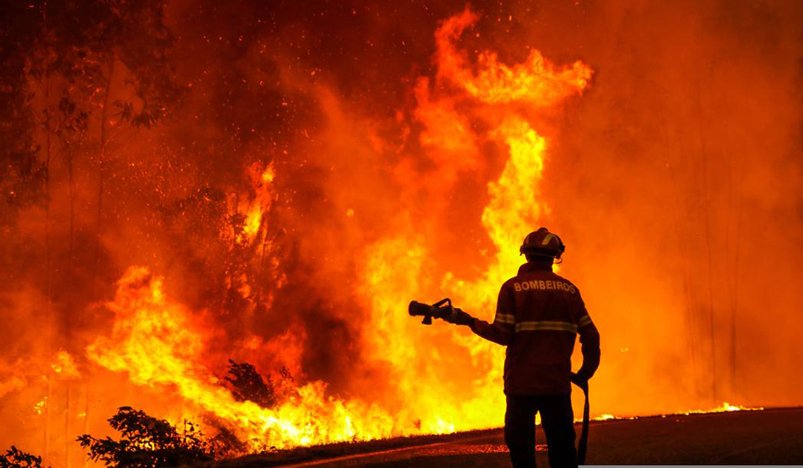
Hot weather
Heat-related deaths will triple over coming decades without government action on overheating in our homes, warn its advisors on climate change.
The alert comes amid the first UK red extreme heat warning, with potentially life-threatening record highs near 40C expected as far north as York.
As many as 4.6 million homes overheat, according to a recent survey - and that's just in England.
But until this summer no rules governed overheating in new buildings.
"We've been telling the government for over 10 years that we are nothing like well enough prepared in the UK for the really hot weather we are seeing now," Baroness Brown, deputy chair of the Climate Change Committee, told the BBC.
"We really do need to address the overheating risk in peoples' homes."
The Climate Change Committee says that more than half a million new homes liable to overheating have been built in the UK since it first raised the issue almost a decade ago.
While the Met Office classes heatwaves as "extreme weather events", scientific research shows that climate change is making them more likely.
Heatwaves caused an additional 2,000 deaths in 2020, according to the UK Health Security Agency.
Much of the risk to health is from heat inside our homes, yet the government only brought in regulation requiring new build homes to be tested for overheating in June this year.
The lack of regulation is visible in the country's housing stock, says James Prestwich of the Chartered Institute of Housing, which represents housing professionals.
"We've seen buildings designed that don't cope well with the increased temperatures we now experience in summer," says Mr Prestwich.
The problem is particularly acute in new build flats in city centres, he says.
"What we've seen is buildings that have been built with a lot of glass and not necessarily the best through flow of air through corridors."
He could be describing Sydney Taylor's flat.
She lives in a dramatic modern building beside a canal in the Ancoats area just outside Manchester's city centre.
There is a lovely view from the floor to ceiling windows, but the flat becomes a greenhouse when the weather is warm.
She says she recorded temperatures of 36C last summer and worries it could get even hotter this week.
"I'm just getting cooked all day," she tells me. "The only breeze I have is from the fan, which is just regurgitating the hot air, it doesn't cool me down."
"The bedroom can be over thirty degrees," says Sydney. "Sometimes I use ice packs to keep cool in bed."
Sydney has underlying health conditions, which she says the temperatures in her home are making worse.
Last summer she even slept in the communal hallway for two nights to escape the unbearable heat.
The true scale of the health risk that Britain's overheating homes present is hard to assess.
Heat stress exacerbates underlying conditions like asthma, heart disease and mental illness.
The symptoms of heatstroke - including confusion, cramps and fatigue - can be hard to differentiate from other medical conditions, including Covid-19.
As a result, heat is not always mentioned as a factor on death certificates, which makes it hard for coroners and medical professionals to assess how big a health hazard it really is.
Baroness Brown says it will take years for the rules on overheating in new homes to make an impact, and that the government must urgently act to reduce the risk in millions of existing homes.
"We don't have any policy for the existing building stock or indeed for permitted development where things like office blocks are turned into homes," she says. "If we don't take more action we'll see probably at least a tripling of heat related deaths in this country."
Retrofitting homes to reduce overheating can be very expensive, warns Professor Kevin Lomas of Loughborough University, who has spent more than two decades studying overheating in British homes.
He says many homes will need new windows or air conditioning.
But he also says simple measures can provide some immediate help, like electric fans and closing windows and curtains during the heat of the day and then opening them at night to let in cooler air.
The problem is only going to get worse.
"When it comes to summer heat, climate change is a complete game changer and has already turned what would once have been called exceptional heat into very frequent summer conditions," warns Dr Friederike Otto, a senior lecturer in climate science at Imperial College London.
Every heatwave we experience today has been made hotter because of the fossil fuels we have burned, she says.
The hottest day of the year is, on average, already nearly 1C warmer than in the 1970s, says Dr Vikki Thompson, a climate scientist at the University of Bristol Cabot Institute for the Environment.
Across Britain extended periods of hot weather have doubled in length since the period 1961-1990, she points out.
South-east England has seen the greatest changes - with a tripling of warm spells.
BBC
.jpg)
Qatar Secures Place Among the World's Top 10 Wealthiest Nations
.jpg)
Hamad International Airport Witnesses Record Increase in Passenger Traffic

Saudi Arabia: Any visa holder can now perform Umrah

What are Qatar's Labour Laws on Annual Leave?
Leave a comment